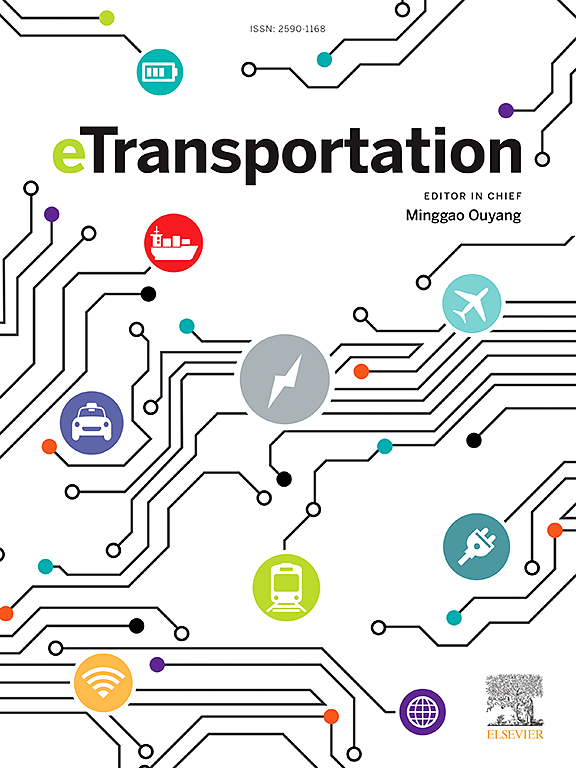用于电动汽车热管理系统的带余热回收的级联热泵系统对能源、经济和环境影响的性能调查
IF 17
1区 工程技术
Q1 ENERGY & FUELS
引用次数: 0
摘要
这项研究解决了传统电动汽车热管理系统的低效问题,这些系统使用单个压缩机来满足电池和客舱的热需求。这种配置往往导致低效的能源利用,由于不同的热需求的电池和客舱。为了应对这些挑战,我们提出了一个梯级热泵系统,该系统具有两个压缩机和两个独立的制冷剂循环,分别管理电池和客舱的热负荷。此外,该系统在冬季条件下将废热用于舱室供暖。通过实验数据验证,建立了仿真模型,以评估不同充电条件和不同行驶周期下的能源消耗。结果表明,与传统的单压缩机系统相比,叶栅系统显著降低了能耗。在电池充电过程中,基于温度的自适应压缩机控制在夏季和冬季平均节能分别为50.2%和25.9%。在电动汽车运行过程中,串联系统在所有驾驶循环中持续降低总能耗,在夏季NEDC条件下将行驶里程效率从4.33公里/千瓦时提高到6.15公里/千瓦时。在10年的时间里,减少的能源消耗转化为16.6%的经济效益和23.6%的二氧化碳排放量减少。这些发现强调了级联热泵系统在夏季和冬季优化能源使用的能力,为电动汽车提供了更高的经济和环境效益。本文章由计算机程序翻译,如有差异,请以英文原文为准。
Performance investigation of the cascade heat pump system with waste heat recovery for electric vehicle thermal management systems on energy, economic and environmental impact
This study addresses the inefficiencies of traditional EV thermal management systems that use a single compressor for both battery and cabin thermal needs. This configuration often results in inefficient energy utilization due to the differing thermal demands of the battery and cabin. To address these challenges, a cascade heat pump system was proposed, featuring two compressors and two independent refrigerant cycles to manage battery and cabin thermal loads separately. Additionally, the system reutilized waste heat for cabin heating under winter conditions. A simulation model, validated with experimental data, was developed to evaluate energy consumption under various scenarios, including diverse charging conditions and driving cycles. The results demonstrated that the cascade system significantly reduced energy consumption compared to conventional single-compressor systems. During battery charging, adaptive compressor control based on temperature achieved an average energy reduction of 50.2 % in summer and 25.9 % in winter. During electric vehicle operation, the cascade system consistently reduced total energy consumption across all driving cycles, improving driving range efficiency from 4.33 to 6.15 km/kWh under summer NEDC conditions. Over a 10-year period, the reduced energy consumption translated to a 16.6 % economic benefit and a 23.6 % reduction in CO2 emissions. These findings highlight the cascade heat pump system's ability to optimize energy usage in both summer and winter, offering enhanced economic and environmental benefits for electric vehicles.
求助全文
通过发布文献求助,成功后即可免费获取论文全文。
去求助
来源期刊

Etransportation
Engineering-Automotive Engineering
CiteScore
19.80
自引率
12.60%
发文量
57
审稿时长
39 days
期刊介绍:
eTransportation is a scholarly journal that aims to advance knowledge in the field of electric transportation. It focuses on all modes of transportation that utilize electricity as their primary source of energy, including electric vehicles, trains, ships, and aircraft. The journal covers all stages of research, development, and testing of new technologies, systems, and devices related to electrical transportation.
The journal welcomes the use of simulation and analysis tools at the system, transport, or device level. Its primary emphasis is on the study of the electrical and electronic aspects of transportation systems. However, it also considers research on mechanical parts or subsystems of vehicles if there is a clear interaction with electrical or electronic equipment.
Please note that this journal excludes other aspects such as sociological, political, regulatory, or environmental factors from its scope.
 求助内容:
求助内容: 应助结果提醒方式:
应助结果提醒方式:


